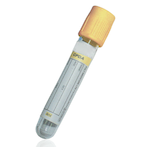Carcino Embryonic Antigen (CEA)
Specimen Volume
5-10 mL vacutainer (minimum sample volume 200 uL)Sample Preparation
Turnaround Time
1 daySample Processing In Laboratory
UsualSample Stability
Stable at 4 ºC for up to seven days. For longer periods store the serum at -20 ºC.General Information
The specificity of CEA (30–80%) for colorectal cancer is compromised by its plasma concentration not being consistently elevated in colorectal cancer: it may be undetectable or present at only low concentrations with poorly differentiated tumours.
The sensitivity of CEA (~40%) for colorectal cancer is compromised by its being detectable in some benign, conditions (particularly gastrointestinal) and in some non-colorectal tumours, e.g. gastric, cervical and non-small cell bronchial carcinomas.
Smokers frequently have higher plasma concentrations of CEA than non-smokers (typically up to twice the value).
If CEA is misused as a screening test for cancer and a high value is found, the appropriate further investigation will depend on any clinical findings. In an asymptomatic non-smoker, with only a slightly elevated value, a pragmatic approach would be to repeat the test after one month: a rising value would be more likely to represent malignancy than a stable one.
Potential limitations/interferences:
Specimens from patients who have received preparations of mouse monoclonal antibodies for diagnosis or therapy may contain human anti-mouse antibodies (HAMA). Such specimens may show either falsely elevated or depressed values when tested with assay kits which employ mouse monoclonal antibodies.
Please inform the laboratory if the patient has been treated with monoclonal mouse antibodies or may have received them for diagnostic purposes.
Caution should be used when interpreting increasing CEA concentrations during the early phase of systemic treatment as certain treatments (e.g., 5-fluorouracil and levamisole; oxaliplatin) can cause transient elevations in CEA levels in the absence of disease progression.
Patient Preparation
Notes
Awareness of the limitations of tumour markers is crucial not only because of the economic implications of their misuse but even more importantly because inappropriately used tumour marker results can cause patients additional anxiety and distress. Unnecessary investigations (such as biopsy) may be associated with serious side effects and may delaying correct diagnosis and treatment.
CEA is insufficiently sensitive or specific to be of value in screening for or diagnosing colorectal cancer. CEA is only recommended for monitoring certain patients following resection of colorectal cancer, when it may provide lead time for early detection of metastasis, but the clinical value is unclear. There is considerable between-method variation, such that it is advisable to use the same method of CEA measurement for monitoring purposes.
Reference Range
Adults <5µg/L
Source of Reference Range
Manufacturer's test information.Specifications
- EQA Status: NEQAS
- EQAS Scheme: Yes








